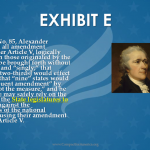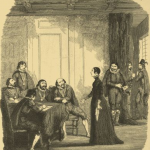Ben Franklin famously replied when asked about the government that was created by the Constitution: “A republic, if you can keep it.” “Democracy ” Not In Any Founding Document The US is a Constitutional Republic, not a “democracy.” No American founding document, not the Declaration of Independence, the Articles of Confederation, or the Constitution mentions […]
Appellate Court: Plaintiffs Offered No Proof NSA Violated Their Rights
“Plaintiffs must realize that secrecy is yet another form of regulation, prescribing not ‘what the citizen may do’ but instead ‘what the citizen may know.’” US Appellate Court Judge Janice Rogers Brown “…the public has no interest in saving the government from the burdens of complying with the Constitution.” US District Court Judge Richard Leon […]
The First Republican Debate Group and the Constitution
President Obama has been criticized for overstepping constitutional boundaries with his governing approach dependent on his “pen” and his “phone”. The Supreme Court has made sweeping constitutional decisions regarding Obamacare and same sex marriage. Both the executive and the judiciary have been described as “lawless” in these and other contexts. That description principally addresses perceived […]
New Hampshire Ratifies June 21, 1788 and Constitution Becomes Effective
On June 21, 1788. New Hampshire was the ninth state to ratify the United States Constitution. Pursuant to the Constitution’s Article VII New Hampshire’s ratification put the Constitution officially in effect. Although New Hampshire ratified, the delegates to its ratification convention clearly had reservations. The ratification message included a dozen suggestions for constitutional amendments pursuant to Article […]
The Fifth Amendment’s Due Process Clause, Descendant of the Magna Carta
“No freemen shall be taken or imprisoned or disseised or exiled or in any way destroyed, nor will we go upon him nor send upon him, except by the lawful judgment of his peers or by the law of the land.” Magna Carta, Chapter 39, June 15, 1215 June 15, 2015 marks the 800th Anniversary […]
Compact for America Solution to Article V Convention Issues According to the Founders, Part III
The preceding Part I and Part II, containing Exhibits A through G overwhelmingly establish the laser-focus of the Compact for America approach on advancing and ratifying a specific amendment is four-square what the Founders expected from Article V. Simply put, the Founders clearly meant for the Article V convention’s agenda to be set in fine detail […]
Compact for America Solution to Article V Convention Issues According to the Founders, Part II
This the second in a series of articles that examine the Founders’ opinions on how the Article V Convention process should have clear focus. The US Constitution’s Article V provides two methods for proposing constitutional amendments. The Compact for America is an initiative to employ the method that has not been used: a convention of […]
Compact for America Solution to Article V Convention Issues According to the Founders, Part I
The goal of the Compact for America (“CFA”) initiative is for the states to propose and ratify the powerful balanced budget amendment that is contained in the Compact for a Balanced Budget into the United States Constitution in as little as one session year, with a target of July 4, 2017, and a “do or die” date of April […]
Sixth Amendment Right to Be Informed of Criminal Charges
It certainly seems obvious and fair that when the government charges someone with a crime that the person be told what law he has violated and what he did to violate that law. That a government does not always conduct itself in a fair manner and that it needs to be reminded of the obvious […]















The “Prime Time” Republican Primary Debate and the Constitution
Both President Obama and the Supreme Court have been described as “lawless” in respect to the Constitution. That description addresses actions perceived to be outside the authority granted to them by the Constitution. With such criticisms, what might Americans have to look forward to in respect to the constitutional rule of law in a new […]